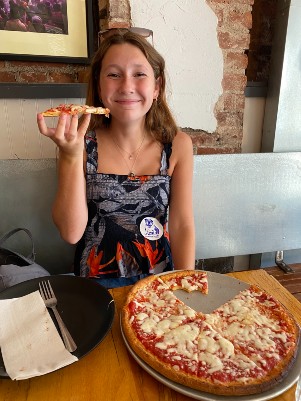Maia's Story
It has been more than 10 years since Maia first started to exhibit symptoms that would ultimately lead to her celiac disease diagnosis.
“Coming into first or second grade, my health started to decline very rapidly as the result of a variety of gastrointestinal, mental and physical problems,” Maia explained. “I was very sick all the time, and experienced challenges going to school, making friends and talking socially.”
An Unknown Diagnosis
 Maia, now 16 and a high school junior, recalls that at the time, celiac disease seemed relatively new and not as well-known as it is today. She remembers visiting a lot of doctors, allergists and mental health professionals, but it was her mom who eventually looked up her symptoms and figured out that it might be celiac disease.
Maia, now 16 and a high school junior, recalls that at the time, celiac disease seemed relatively new and not as well-known as it is today. She remembers visiting a lot of doctors, allergists and mental health professionals, but it was her mom who eventually looked up her symptoms and figured out that it might be celiac disease.
“One of the reasons why celiac disease can be so difficult to diagnose is because it can affect every bodily system,” says Kate Raber, program coordinator, Celiac Disease Program at Children’s National Hospital.
When first seeking treatment, Maia met with a gastroenterologist, but remembers feeling like she was not being treated for all the symptoms she was experiencing.
Trying Something New
Since its inception in 2009, the Celiac Disease Program at Children’s National has taken a unique, holistic approach to the treatment and care of its patients.
“We were the first pediatric celiac disease program in the nation to employ a full-time psychologist dedicated solely to the psychological care of patients with celiac disease,” Ms. Raber said. “Additionally, we have pioneered several studies which have contributed to the medical world’s understanding of living life with celiac disease.”
When Maia transitioned her care to Children’s National when she was 12, she noticed an immediate difference in the team’s approach and felt like all her needs were being met. This included help advocating for a 504 plan, which provides Maia with accommodations at school if she accidentally consumes gluten – something she did not know was possible for those with celiac disease.
 “It felt nice moving to a place where every part of celiac disease is being addressed,” Maia said. “I really appreciate the approach at Children’s National. They don’t just focus on ‘when you eat gluten, your stomach hurts.’ It goes far beyond that. I feel like I’m really being seen and addressing all parts of it – mental and emotional.”
“It felt nice moving to a place where every part of celiac disease is being addressed,” Maia said. “I really appreciate the approach at Children’s National. They don’t just focus on ‘when you eat gluten, your stomach hurts.’ It goes far beyond that. I feel like I’m really being seen and addressing all parts of it – mental and emotional.”
Thanks to the support and care received from the Celiac Disease Program, Maia feels like she now has a good grasp on her condition and the management of her health.
“Despite several diagnoses involving food restrictions, Maia has remained dedicated to keeping herself healthy and happy and is an excellent advocate for herself in her health journey,” Ms. Raber said.
While the regularity of her visits as a patient have decreased over time, Maia has been able to stay involved. This past summer, she joined the Celiac Disease Program as a volunteer, with her sights set on giving back.
Helping Those Like Her
Maia enjoys volunteering and is hopeful that in this new role she can connect with younger patients to help them feel more at ease with what they are going through. “I felt like I could help younger kids who at one time may have been nervous like me,” Maia explained. “I enjoy helping others.”
 She wants to help those who are diagnosed navigate this disease by sharing her experience and wisdom – to show them that it’s going to be okay and that they do not have to figure out everything on their own.
She wants to help those who are diagnosed navigate this disease by sharing her experience and wisdom – to show them that it’s going to be okay and that they do not have to figure out everything on their own.
“We are excited to see her grow into her role as a volunteer with the Celiac Disease Program,” Ms. Raber said. “Maia brings excellent self-advocacy tools to the table to help other children and teens with celiac disease.”
A Voice for Others
It’s this commitment to advocacy and helping others that also drives Maia’s professional ambitions.
“I’ve known this since I was very little, but I think I want to be a lawyer. I’m not sure exactly what kind of lawyer, yet, but I like the idea of working every day to help advocate for other people.”
